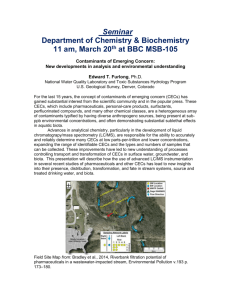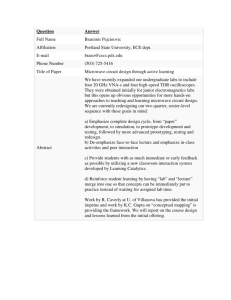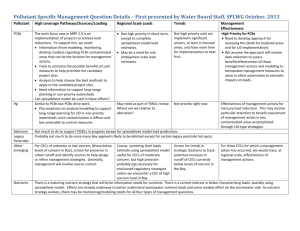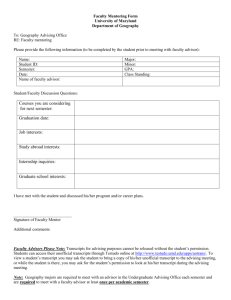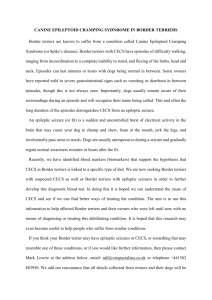CECS Undergraduate Student Handbook
advertisement
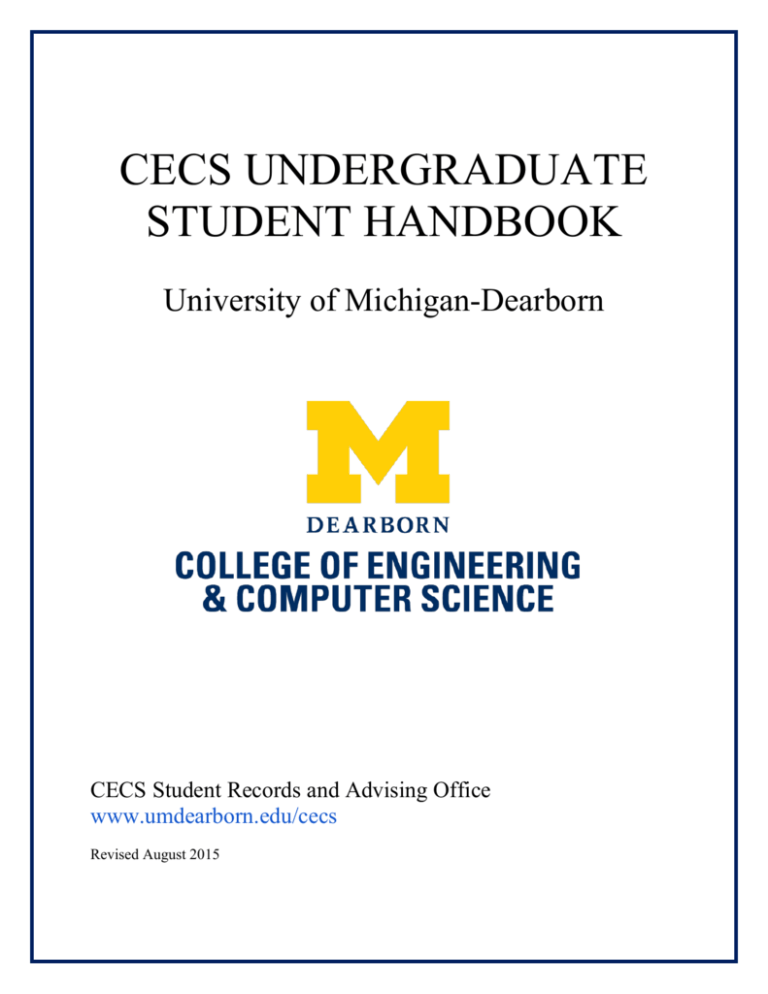
CECS UNDERGRADUATE STUDENT HANDBOOK University of Michigan-Dearborn CECS Student Records and Advising Office www.umdearborn.edu/cecs Revised August 2015 TABLE OF CONTENTS I Academic Advising and Student Responsibility……………………………………3 II Check Lists to Assist You in Completing Your Degree ............................................ 5 II Offices and Programs to Know About ...................................................................... 6-7 III Where to Find Tutoring and Other Academic Help ................................................. 7 IV The Academic Code of Conduct VI College of Engineering and Computer Science Degree Programs VII Academic Advising Information and Resources ........................................................ 9 VIII Important Academic Policies .................................................................................... 10-11 IX Types of Academic Standing ..................................................................................... 12 X Preparing to Graduate; Senior Audits; Graduation Requirements and Application ... 13 XI Placement Exams: English Composition, Mathematics, and Foreign Languages ..... 13 .............................................................................7 ........................ 8 XIII Registration and Degree Works Information ............................................................. 14 Appendices List of No Credit Courses in Bioengineering, Electrical, Industrial and Systems, Manufacturing, Mechanical, Computer and Robotics Engineering .............. 15 List of No Credit Courses in Computer and Information Science, Digital Forensics, and Software Engineering ............................................................................ 16 2 I. Academic Advising: A Shared Effort for Success Welcome to the College of Engineering and Computer Science at UM-Dearborn! We hope your education here is enjoyable and rewarding. Academic advising will play an important role in your success. To get the most of your advising experience, it’s important to understand the unique advisor and student roles that can lead to a strong connection throughout the advising process. Advising Office Mission: The mission of the CECS Advising Office is to provide meaningful academic support to undergraduate students toward the achievement of educational and career goals. Academic advising is a collaborative partnership between advisor and student, one which informs and empowers students to take responsibility for their educational paths and to make sound decisions consistent with their personal values and goals. Advising Learning Outcomes CECS Academic Advising will empower students to: Understand the curriculum requirements for their chosen major(s). Demonstrate their knowledge of curriculum requirements through their ability to select courses each semester that are appropriate to their chosen major(s). Demonstrate an understanding of CECS and university academic policies, and articulate how following policies carefully will aid in meeting their academic goals. Demonstrate proficiency in using campus resources (Degree Works, UM-Dearborn Connect, course catalog, etc) for educational planning and course selection. Utilize the partnership with their academic advisor to explore and choose a major that is consistent with one’s personal values, career goals, and academic strengths. Students will be able to articulate their personal career and educational goals. Understand the benefit that involvement in student organizations, cooperative education opportunities, and other extra-curricular activities will have on meeting educational and career goals. Be aware of the many resources available on campus (Student Success Center, Counseling Services, etc), and how to locate these resources when needed. Student Role in Academic Advising Process Have you heard the phrase “you get out of your college experience what you put into it”? The same is true of your advising experience. Students are an active partner in the academic advising process. The following guidelines can help you make the most of the time you have with your advisor. Come prepared to take notes and ask questions when meeting with your advisor Gather all information needed to make well-informed decisions about your education Don’t be shy about discussing your true academic and career goals Read and become familiar with the course catalog, registration deadlines, your curriculum sheet, and relevant university policies Take responsibility for your education and the decisions you make along the way 3 Student Responsibility It is each student's responsibility to learn the requirements, policies, and procedures governing their program of study and to act accordingly. Students should consult their advisor regularly to ensure they are meeting degree requirements in a timely fashion. Although advisors provide assistance, responsibility for fulfilling degree requirements remains with the student. Students are responsible for the information in the Undergraduate Catalog, the curriculum requirements for their major, and the UM-Dearborn registration webpage: www.umd.umich.edu/rr_registration. These sources contain important information such as: dates to register, add, drop, and pay tuition; prerequisites for courses; the final exam schedule; and many other important regulations, procedures, and requirements. CECS Student Records and Advising Office 2000 Heinz Prechter Engineering Complex The University of Michigan-Dearborn Dearborn, MI 48128-2406 http://umdearborn.edu/cecs/SRA Phone: (313) 593-5510 Fax: (313) 593-9967 Office hours: 8:00 a.m. - 6:00 p.m. Monday and Thursday 8:00 a.m. - 5:00 p.m. Tuesday, Wednesday, and Friday Academic advisors are assigned to students by their last name: Last names A to J Last names L to M Last names K, N to Z Kerri Madeleine Academic Advisor kmadelei@umich.edu Lisa Remsing Hall Advising Director lremsing@umich.edu Jennifer Makas Academic Advisor jmakas@umich.edu The CECS Student Records and Advising Office is the students' central contact for all undergraduate programs and provides many services and information, including: Information about degree programs, requirements, and academic policies Choosing, declaring, and changing your major, or declaring a minor or certificate Adding or dropping courses and total withdrawal from all courses for the semester Academic orientation, course selection, and course registration Determining your progress towards graduation: “Senior Audit” Readmission of CECS students previously enrolled at UM-Dearborn Information concerning appeals and petitions Certification that graduating seniors have met all degree requirements Referral to other University offices for assistance. 4 II. Check Lists to Guide Your Success and Degree Completion New Students (before classes begin): Take the English Composition and Mathematics placement exams. (Page 13) Attend orientation; meet with the CECS academic advisors and register for your classes. Take part in the Mathematics Summer Bridge program if needed, to strengthen your skills. Freshman and Sophomore years: Become familiar with university policies, deadlines to add/drop courses, and the difference between dropping one course and totally withdrawing from all courses. Form study groups in your classes. Do extra practice through the Math Learning Center, the Student Success Center, and other offices. Develop time management and effective study skills. Join a student or professional organization to start networking with classmates. Get to know your instructors; start by meeting with them during office hours. Plan out ahead of time all the courses you will take until you graduate. Check that you are taking the courses that are pre-requisites for other courses so that you’ll be able to take your courses in proper sequence. Check with your advisor about your course plan. Learn how to use Degree Works for course planning. Make your required advising appointment each semester with your assigned academic advisor so you can register for your next semester classes. Choose and declare your major, if you were “undecided engineering” when admitted. Plan to take the courses needed for co-operative education. See the Co-op office and attend co-op information sessions. Take advantage of the programs and services – such as study abroad programs – offered through the College and by the University. (Page 6) Junior and Senior years: You are now assigned to a faculty advisor in your major. See UM-Dearborn Connect to find the name of your advisor. Consult your advisor about course plans and career goals. Check that you are meeting your degree requirements. Once you have 86 credits towards your degree (not 86 credits total) a CECS advisor will complete your Senior Audit (Page 13). You do not need to request a senior audit; one will be done for you once you have earned 86 credits toward degree. The semester prior to your last semester, make an appointment with the CECS advising office to check that you will meet all your degree and graduation requirements. Register at the Career Services Office (2149 UC) for assistance in finding employment. Submit your Diploma Application online by the 4th week of your last semester. 5 III. 1. Important Offices and Programs Academic Departments of the College of Engineering and Computer Science: Computer and Information Science (CIS) Department 105 CIS Building http://umdearborn.edu/cecs/CIS (313) 436-9145 Electrical and Computer Engineering (ECE) Department 206 Engineering Lab Bldg http://umdearborn.edu/cecs/ECE (313) 593-5420 Industrial & Manufacturing Systems Engineering (IMSE) Department 2340 Engineering Complex http://umdearborn.edu/cecs/IMSE (313) 593-5361 3. 4. Mechanical Engineering (ME) Department 1340 Engineering Complex http://umdearborn.edu/cecs/ME (313) 593-5241 CECS Co-operative Education Office Fairlane Center North http://umdearborn.edu/cecs/COOP (313) 593-5078 Study Abroad Programs See the CECS Student Records and Advising Office for more information on the following opportunities. Germany: Mechanical Engineering majors may take Fall semester engineering courses taught in English at the University of Applied Sciences in Ulm: www.hs-ulm.de/en/. Sweden: CECS students may study for up to one year at the School of Engineering in Jönköping University in Jönköping, Sweden (http://hj.se/en/about-us/school-ofengineering.html) as part of an on-going student exchange program. Technical courses in Jönköping are taught in English. Students studying in Ulm or Jönköping register for their courses at UM-Dearborn, pay their normal tuition, and are covered by their financial aid as they normally are. The only additional costs are airfare and room and board. It is important to note that the course grades earned contribute to your UM-Dearborn GPA. Other study abroad opportunities are available through the Office of International Affairs. Please see http://umdearborn.edu/io_studyabroad/ for more information. Prechter International Travel Fellowship CECS students may be eligible for a travel fellowship to help defray some of the cost of travel associated with approved international studies. The fellowships are made possible by a gift from Ms. Waltraud Prechter. Students planning to participate in international studies as part of their CECS degree program should contact Lisa Remsing Hall, Advising Director, at 313-593-5510 or lremsing@umich.edu. 6 5. Career Services Office, 2149 University Center http://umdearborn.edu/careerservices/ (313) 593-5020 Career Services assists in finding a job during school, professional employment upon graduation, career interest assessment, job search and job listings, job fairs, career and salary information, how to research a company you’re interested in, and alumni contacts. 6. Counseling and Disability Services, 2157 University Center http://umdearborn.edu/css_support/ (313) 593-5430 • Confidential personal counseling services • Disability Services provides accommodations to students with disabilities • Student medical insurance information and health referral services 7. Ombuds Services, 2106 University Center http://umdearborn.edu/ombudsservices/ (313) 593-5440 Ombuds Services provides students with individual, informal assistance in resolving concerns and addressing issues regarding student rights and responsibilities. 8. Student Organizations – College of Engineering Computer Science http://umdearborn.edu/cecs/cur_students/studorg.php Student and professional organizations offer opportunities to meet and make friends, to develop professionally, provide service, and exercise leadership. The Office for Student Engagement, 2136 University Center, has a full list of student organizations. http://umdearborn.edu/studentengagement/sao_student_organizations/ III Where to Find Tutoring and Other Academic Help Your professor and/or lab assistant can provide academic help in specific courses. Below are additional services that are available. 1. Student Success Center, 2170 University Center http://umdearborn.edu/ssc_asos/ (313) 593-5340 2. Math Learning Center, 2076 CASL Building http://umdearborn.edu/casl/685053/ (313) 583-6351 3. Writing Center, 3035 CASL Building http://umdearborn.edu/casl/writ_center/ (313) 593-5238 IV The Code of Academic Conduct The University of Michigan-Dearborn values academic honesty and integrity. Each student has a responsibility to understand, accept, and comply with the University's standards of academic conduct as set forth by the Code of Academic Conduct, as well as policies established by the schools and colleges. Cheating, collusion, misconduct, fabrication, and plagiarism are considered serious offenses. Violations will not be tolerated and may result in penalties up to and including expulsion from the University. The Code of Academic Conduct can be found at: http://umdearborn.edu/697817/ 7 VI College of Engineering and Computer Science Undergraduate Degree Programs Bioengineering (BENG) Computer and Information Science (CIS) Computer Science (CS) concentration or Information Systems (INSY) concentration Computer Engineering (COEN) Digital Forensics (DFOR) Electrical Engineering (EE) Industrial and Systems Engineering (ISE) Manufacturing Engineering (MFGE) Mechanical Engineering (ME) Robotics Engineering (RE) Software Engineering (SWE) Engineering Mathematics* CIS Mathematics* * (Engineering Math and CIS Math are concurrent degrees, that is, they can only be obtained at the same time as another B.S.E. or B.S. degree in a CECS major.) CECS Concurrent Degrees are available in the following majors. These concurrent degree programs require only 16-17 credits of additional course work. Both Bioengineering and Mechanical Engineering (BENG/ME and ME/BENG) Both Computer and Electrical Engineering (EE/COEN and COEN/EE) Both Industrial and Systems and Manufacturing Engineering (MFGE/ISE and ISE/MFGE) Mechanical and Manufacturing Engineering (ME and MFGE: this order only) Degree requirements are found online: http://umdearborn.edu/cecs/SRA/circ_requir.php And in Degree Works: https://web-sis.umd.umich.edu Declaring a Major: Students who were “undecided” when admitted must choose and declare their major upon attaining 45 credits. Students who want to change majors must meet department GPA requirements to be accepted. Dual Degrees: students may obtain two degrees, one from CECS and one from another academic unit (e.g., CIS and Economics) by being admitted to the two programs and completing each of them. Dual degrees require a minimum of 30 additional credits. Minors are not required, but students may choose a minor if they wish. Minors in many CASL and business subjects are available: www.umd.umich.edu/a-zminors/. CECS offers a minor in CIS: http://umdearborn.edu/cecs/SRA/pdf/CIS_Minor_2006.pdf Forms for declaring majors and minors can be found in the Advising Office, 2000 HPEC, or online at http://umdearborn.edu/cecs/SRA/forms.php 8 VII Academic Advising Information and Resources 1. Curriculum Sheets list the required courses for a given major and catalog year: http://umdearborn.edu/cecs/SRA/circ_requir.php. FALL 2015 FRESHMEN MUST FOLLOW THE DEARBORN DISCOVERY CORE (DDC) REQUIREMENTS, AND SHOULD FOLLOW THEIR DEGREE WORKS DEGREE AUDIT TO DETERMINE PROGRAM REQUIREMENTS. DEGREE WORKS CAN BE ACCESSED THROUGH UM-DEARBORN CONNECT, HTTPS://WEB-SIS.UMD.UMICH.EDU 2. Sample Course Sequence Sheets provide an example of the sequence in which courses may be scheduled: http://umdearborn.edu/cecs/SRA/sample_sequence.php Check that you are taking the courses that are pre-requisites for other courses so that you’ll be able to take your courses in proper sequence. Some courses are offered only once a year and you need to plan accordingly. Check your course plan with your advisor. 3. Course Pre-Requisites: A list of the pre-requisites for CECS courses is available online. Students must follow the proper prerequisites and co-requisites to enroll in a course. http://umdearborn.edu/cecs/SRA/pdf/Pre-Requisites_for_CECS_Courses.pdf 4. Course Load: Because of the mathematics and laboratory courses in CECS programs, the College recommends that full-time students take 12-14 credits per semester. For every hour of class students may expect at least 3 to 4 hours of homework, sometimes much more. CECS students should take mathematics every term until the mathematics sequence is completed. 5. Required Advising: All CECS students are required to meet with their advisor prior to each registration. After advising, the “Required Advising Hold” is released and students can then register at their assigned time. Advisors are assigned in October for Winter semester advising, and in February for Summer and Fall semester advising. A student’s assigned advisor can be found in UM-Dearborn Connect. 6. Preparing for Your Advising Appointment: We recommend that you follow these simple steps to prepare for your required advising each semester. Schedule your appointment well in advance of your registration date. Have a good idea of what courses you need to take during the next semester. You can use the curriculum sheets, course sequence sheets, and Degree Works as a guide. Complete your election sheet as completely as possible before your appointment. Prepare and write down questions you may have of your advisor, so you don’t forget them! Bring note-taking materials with you to your appointment. 9 VIII Important Academic Policies The UM-Dearborn’s Undergraduate Catalog http://umdearborn.edu/catalog/ and sites http://umdearborn.edu/policies_umd/ and http://umdearborn.edu/registration/ have full information about university policies. Some key policies are highlighted below: 1. Grades: All courses required for CECS students must be taken for a letter-grade. All grades count as part of a CECS student's grade point average, except for passing grades in “additive credit” courses (ex: courses numbered 001 to 099). CECS students cannot take required courses on an audit or Pass/Fail basis. Any course audited or taken Pass/Fail will not count towards the degree, even as a general elective. No-Credit Courses (listed at end of this handbook) also do not count. 2. Grades in Repeated Courses: All grades are part of a student's permanent record. If a student receives a grade in a course and then repeats it, both the original grade and the new grade are shown on the transcript, but only the most recent grade, whether higher or lower, is used in computing the GPA. 3. Per university policy, students may take a course a maximum of three times. CECS students who have not successfully completed a course within the three-course limit may be required to leave the major for which that course is required. The policy for repeated courses is online: http://umdearborn.edu/policies_repeat/ 4. The D- Repeat Policy: Any course in which a CECS student earns the grade of Ddoes not count toward degree. Any course in which a CECS student receives a D- must be repeated and must be passed with a higher grade in order for the course to count towards a CECS degree. This policy applies to all CECS students. 5. The Probation Repeat Policy: It is a CECS degree requirement that any required courses with grades of C- or less must be repeated if taken in any term at the end of which a student's overall cumulative GPA, CECS cumulative GPA, or both, drops below 2.0. A student who has been placed on probation and earned a grade of C- or less in a pre-requisite course must repeat the prerequisite before taking the follow-up course. 6. Registration Deadlines: Students are responsible for knowing and abiding by all registration deadline dates (http://umdearborn.edu/rr_academic-calendar/). Late adds and late drops are rarely permitted for CECS students. 7. Absences from Class: Students who miss classes should contact their instructors directly. Students will not be dropped from courses for non-attendance; an “E” grade is assigned if the course is not officially dropped. Students should confer with their instructor and advisor before dropping a course, but the decision to drop a course is the student’s responsibility. 10 8. Petitions: A petition is a written request for an exception to a rule or regulation. The Advising Office, 2000 HPEC, handles petitions for CECS students. Students are encouraged to submit any additional documentation possible to support their petition request. Transfer students may petition for credit for courses taken at a previous university. Submit copies of as much documentation as possible, including: a) the college catalog course description b) the course syllabus c) the textbook’s table of contents d) course notes, exams, quizzes, or programs. 9. Total Withdrawal: students may withdraw from all their courses for a given semester up to the last day of classes (NOT the last day of exams). CECS students who wish to withdraw from all their classes need the signature of an Academic Advisor (2000 HPEC). 10. “I” and “X” Marks: A student whose coursework (other than final exam) is incomplete in a minor way, upon the instructor’s approval, may be granted the privilege of a short extension and receive a temporary mark “I”, Incomplete. Important Incomplete policies include: a) An Incomplete Contract must be completed by student and instructor, and submitted to the student’s academic department b) A strict deadline of 5 weeks is granted to CECS students to complete incomplete work, only if an Incomplete Contract is submitted. (http://umdearborn.edu/policies_incomplete-course/) A student who is unavoidably absent from a final exam may, at the instructor’s discretion, be granted the privilege of making up the exam within five weeks after the end of the term involved and receive a temporary “X” mark. If the coursework is not completed within the allowed time, the temporary "I" or “X” mark converts to a permanent "E" grade. 11. “Y” Marks: A “Y” grade indicates a course extends beyond the timeframe of a single term. Students have one year to complete a “Y” grade. If the coursework is not completed within the allowed time, the temporary "Y” mark converts to a permanent "E" grade. 11 IX Types of Academic Standing Two different grade point averages (GPA) are computed for CECS students: a) the overall cumulative GPA and b) the CECS cumulative GPA The overall cumulative GPA counts grades in all courses taken at UM-Dearborn. The CECS cumulative GPA counts grades in CECS courses only. 1. Good Academic Standing: Students are expected to remain in "good academic standing", that is, maintain both their overall cumulative GPA and their CECS cumulative GPA at 2.0 (a C) or higher. 2. Academic Probation: Students are placed on academic probation when either their overall cumulative GPA or their CECS cumulative GPA, or both, fall below 2.0. Probation policies apply to the semester at the end of which the GPA fell below 2.0. Earning a higher grade in a repeated course does not retroactively change the probation status originally assigned using the earlier grade. Once grades are reported and GPAs computed, students are notified of their probation status. Students generally receive their probation letter after the following semester has begun. CECS students who have been placed on probation abide by the following rules: Probation students are restricted to enrolling in a maximum of 13 semester credits. Students on academic probation must repeat any required course in which they earned C- or less in the semester in which their overall cumulative or CECS cumulative GPA fell below 2.0. Students placed on probation who earned C- or less in a prerequisite course must repeat the prerequisite before taking the follow-up course. Students who must repeat a prerequisite will be dis-enrolled from the follow-up course. Probation students have, at most, two terms to raise their GPAs to 2.00 and return to good academic standing. Probation students who do not return to good academic standing may be required to withdraw from the College of Engineering and Computer Science. 3. Required to Withdraw: CECS students whose grades have been continually below the standard necessary for continued enrollment will be required to withdraw from CECS and not allowed further registration. The decision to require a student to withdraw is always made after semester grades are reported. Students required to withdraw are notified as soon as possible and are dis-enrolled from all classes they may have registered for, which are likely to have already begun. Notification to a student required to withdraw takes place AFTER the following semester has begun. 4. Dean's List, Graduation with Distinction Students with a semester GPA of 3.5 or above in at least twelve credits of degree courses are placed on the Dean's List. Students with a final cumulative GPA between 3.2 and 3.59 graduate with distinction; those with 3.6 or above graduate with high distinction. 12 X Preparing to Graduate, Senior Audits, Graduation Requirements and Application Senior Audit. The Advising Office will complete a senior audit for each student who has earned 86 credits toward their degree program. (The number of total earned credits may not be the same as credits that count toward a given degree program.) The student is notified by email when their audit is complete. The senior audit lists the specific courses and other requirements still needed to graduate. Students must meet with an advisor in the Advising Office to review their senior audit. Although advisors will provide assistance, students are fully responsible for knowing and adhering to university policies and procedures and their program's degree requirements and to see that all requirements for graduation are met. Consult the UM-Dearborn Undergraduate Catalog, degree curriculum sheets and other official publications. Diploma Application. Students planning to graduate must submit a diploma application online by the fourth week of your last semester in order to graduate (http://umdearborn.edu/694970/). Students can graduate in Winter, Summer, and Fall, but Commencement ceremonies are only held in Fall and Winter. Students who don’t meet graduation requirements in time to graduate in the semester for which they applied must submit another diploma application if they plan to graduate the following semester. XI Placement Exams: English Composition, Mathematics, and Foreign Languages 1. English Composition Placement Exam. All admitted students to UM-Dearborn are required to take the English Placement Exam. This policy assures a certain level of writing proficiency for all graduates. It is important that all students take the English Placement exam before beginning at UM-Dearborn, and register for the English Composition course which they were placed into. Students can sign up for the exam at http://umdearborn.edu/winterplex/ If a student has not taken the exam within six weeks into their first semester at UMDearborn, they will be placed on registration hold for the next registration period by the Writing Program. 2. Foreign Language Placement Exam. Students who wish to take foreign language courses should contact the Office of Admissions and Orientation at (313) 593-5100 to schedule a placement exam. Foreign language course credit is not awarded by exam. Students who have taken two or more years of foreign language, and wish to continue courses in the same language, must take a placement exam. 13 3. Mathematics Placement Exam and Mathematics Course policies for CECS students Mathematics placement information: http://umdearborn.edu/casl/mathplex/ This link provides details about the topics and skills that students will be tested on when taking the mathematics placement exam. Sample problems are given and there are other links to prepare for taking the exam. • The Mathematics Placement Exam is required of all UM-Dearborn freshmen before they register for a mathematics course. • All transfer students who have completed Pre-Calculus or lower must take the Mathematics Placement Exam. • Students can take the Mathematics Placement Exam up to three times (with 30-day wait periods in between exams) • Students must take and pass the math course they place into. • Students who register for a different math course than the course they placed into will be dis-enrolled from that course. • Students must earn a C- or higher grade to progress to the next math course, otherwise will be required to repeat the course before moving on. • Students who don’t pass a math course cannot retake the placement exam to “place out” of it; they must retake the course and pass it. To schedule your Mathematics Placement Exam, call the Office of Admissions and Orientation at (313) 593-5100 or see http://umdearborn.edu/694933/. XIII Registration Information http://umdearborn.edu/rr_registration/ 1. Click on the UM-Dearborn Connect logo to: o Check the University’s Academic Calendar o Check the Schedule of Classes each semester o Read the Course Catalog descriptions of courses o Get information on closed courses o Look at your final grades o Check what ‘holds’ you have; a ‘hold’ prevents you from registering o Register online – after you are advised and your hold(s) released, logon to the secure area using your ID number and PIN. o Add/drop courses within the first two weeks of a semester. Late adds beyond this period are not permitted. o Check your Degree Works degree audit, a web-based degree audit tool available to students admitted or readmitted to UM-Dearborn in Fall 2013 and forward. Degree Works information can be found at http://umdearborn.edu/rr_degreeworks/ Be careful to check the registration deadlines: http://umdearborn.edu/rr_academiccalendar/ and consult your advisor with questions! Students are responsible for knowing registration deadlines each semester. 2. Wait Lists: If a course is closed (full), students may be able to place themselves on the wait list. See http://umdearborn.edu/rr_reg-info/ for more information. 14 NO-CREDIT courses for B.S.E. degrees in BENG, CE, EE, ISE, MFGE, ME or RE The NO-CREDIT List is not necessarily complete. There may be new courses introduced in other academic units which would be no credit courses for CECS students. Always check with an advisor in the Student Records and Advising Office if you have questions about a specific course. These and any cross-listed courses are also no credit. No Pass/Fail courses count for credit All courses titled "Internship" or "Co-op" or "Co-operative learning" from all colleges Including ECE 299, ECE 399, ECE 499, IMSE 299, IMSE 399, IMSE 499, ME 299, ME 399, ME 499 All “Statistical” or “Analysis of Data” oriented courses Including ECON 305, POL 301, PSYC 312, 381, SOC 383, 464, STAT 325 CIS, MIS, ITM 100 level--except CIS 150 All ART courses (see exception below) BA 100, BA 300, FIN 200 All LIBS courses (see exceptions below) MATH 114, 363, 386, 387, and courses transferring in @ Lower Distribution CHEM 111, courses transferring in @ Lower Distribution PHYS 360, 401, courses transferring in @ Lower Distribution PHYS 406 credit for EE students only NSCI 120, 121, 123, 290 Credit cannot be earned for both PSYC 171 and PSYC 101 GENERAL OR FREE ELECTIVE CREDIT ONLY FOR: ART 360 LIBS 136, 138, or 364 only MAPP 348 - no other MAPP MTHY 102 - no other MTHY EXPS 102 (only when taken as freshman) or EXPS 420 A maximum of 4 Military Science (MILS) credits as general elective credit only. A maximum of 2 Marching Band credits as general elective credit only. CREDIT FOR ONE COURSE ONLY FROM THE FOLLOWING (IN EACH LINE) ECE 375, CIS 310 ECE 371, CIS 350, CIS 3501, IMSE 351, IMSE 352 ECE 276, CIS 275 ECE 3801, ECE 3171, ECE 317 ECE 270, CIS 150, IMSE 255 ECE 370, CIS 200 IMSE 317, MATH 325 CIS 381, IMSE 381, ECE 464 15 NO-CREDIT courses for B.S. degrees in CIS, DFOR OR SWE The NON-CREDIT List is not necessarily complete. There may be new courses introduced in other academic units which would be no credit courses for CECS students. Always check with an advisor in the Student Records and Advising Office if you have questions about a specific course. These and any cross-listed courses are also no credit. No Pass/Fail courses count for credit All “Statistical” or “Analysis of Data” oriented courses Including ECON 305, POL 301, PSYC 312, 381, SOC 383, 464, STAT 325 CIS 205, 125 LIBS 101, 200, 300 MATH 114, 363, 386, 387, courses transferring in @ Lower Distribution NSCI 100 No Credit for MATH 105 if taken after MATH 115 No credit for: CIS 123, ENGR 100, IMSE 255 if taken after completion of CIS 150 EXPS 102 if standing is SO, JR, SR Credit cannot be earned for both PSYC 171 and PSYC 101 GENERAL ELECTIVE AREA RESTRICTION (CIS) 3 credits max from CIS 299, 399, 499 A maximum of 4 Military Science (MILS) credits as general elective credit only. A maximum of 2 Marching Band credits as general elective credit only. CREDIT FOR ONE COURSE ONLY FROM THE FOLLOWING (IN EACH LINE) ECE 375, CIS 310 ECE 371, CIS 350, CIS 3501, IMSE 351, IMSE 352 ECE 321, PHYS 403 IMSE 317, MATH 325 ECE 276, CIS 275 ECE 3801, ECE 3171, ECE 317 ECE 270, CIS 150, IMSE 255 ECE 370, CIS 200 CIS 381, ECE 464, IMSE 381 16
